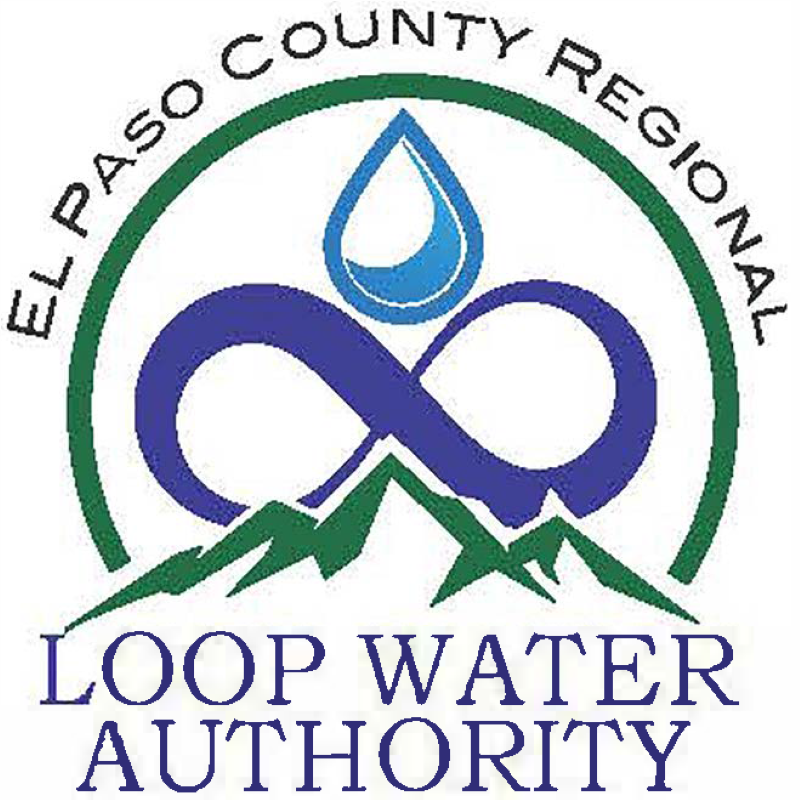In October 2021, The New Falcon Herald published an article by Leslie Sheley on the Loop Water Authority, a project idea brought to the table by Cherokee Metropolitan District with consults from managers of other districts. Simply put, the water from a source in southern El Paso County would be reclaimed and recycled and re-used for northern El Paso County. The area for transporting the water is a loop; hence, the name.
The project, the Loop Water Authority, is underway, and it should make eastern El Paso County, and possibly the Falcon area, less reliant on diminishing and increasingly costly supplies of groundwater from Denver Basin wells.
The project will draw water from Fountain Creek. In addition to being replenished by rainfall and snow melt, treated wastewater and runoff in the northern part of the county flows into Fountain Creek. The creek water will be reclaimed south of Colorado Springs and pumped north, said Kevin Brown, a water resource engineer for Cherokee Metropolitan District.
“We hope that in four or five years we can become operational,” said Amy Lathen, executive director of Cherokee Metropolitan District and a member of the board of directors of the Loop Water Authority.
The Loop Water Authority, which governs the project, consists of representatives of Cherokee Metro District, Donala Water and Sanitation District, which is located just east of the U.S. Air Force Academy and north of Colorado Springs; Woodmoor Water and Sanitation District on the Palmer Divide and in the town of Monument.
Lathen said they need to work out the details, but basically water will be drawn from Fountain Creek at the Chilcott Gate near Fountain and transported in an existing canal 12 miles to the Calhan Reservoir. From there, about 26 miles of pipeline will be constructed to tie into the southern end of an existing Cherokee Metro pipeline near the intersection of Marksheffel and Tamlin roads. Currently, this pipeline takes nonrenewable Denver Basin water from Cherokee’s Sundance well field near Hodgen and Black Forest roads and transports it south via gravity.
With the Loop, Fountain Creek water will be pumped northward to the well field. Then a new pipeline of about 24 miles will be constructed to carry the water to Monument.
According to the 2021 NFH article, Lathen said Cherokee Metro District already has miles of water line in the ground. Formed in 1957 to serve the Cimarron Hills neighborhood, CMD is also a Colorado Title 32 special district; serving water and wastewater to Shriever Air Force Base, plus providing wastewater for Meridian Ranch in Falcon.
All of the northern water districts use the Denver Basin; some even own surface water The Loop Water Authority moving along rights in southern El Paso County; but, at present, that water is not accessible, Lathen said. The use/ re-use plan would take some of the pressure off the Denver Basin wells, plus take advantage of renewable water instead, she said. Other water districts or entities could also draft water off of that line and use some of the return flows in their own systems, which again takes pressure off the Denver Basin wells.
“The bottom line is non-renewable Denver Basin water is already being produced, treated, collected and discharged,” Lathen said. “The Loop project would allow for the reuse of existing Denver Basin water resources plus access to renewable surface water rights that are currently inaccessible.
The cost of the project is unclear at this time, Lathen said. “We are still doing water quality testing,” she said.”We don’t have an engineering design estimate.” She said the original estimate was $150 to $200 million but there are many variables to determine before an accurate cost can be derived. The exact route of pipelines and the number and location of pumping stations and purification stations will have a bearing on the cost. A more southerly treatment station would deliver treated water to all users. Lathen said the Loop is using a $4 million grant in federal funds controlled by El Paso County to fund engineering and financial planning.
The method of financing the project is also an unknown at this time with many variables and options. Some of the participants might contribute toward construction costs. However, Brown said that ultimately the construction and operating costs will be paid from fees received from the utilities that use the system. He said it is unclear if this will be a flat fee or a fee per gallon.
Lathan said each participant in the Loop will be able to contribute something to the project. Cherokee is bringing about $33 million in assets. Donala and Woodmoor will be contributing water rights in Fountain Creek.
“Falcon could be served, at least partially,” Lathen said.
“The key is to have a redundant system” that uses groundwater and surface water. She said much of the area that would be served by the Loop Water Authority is currently using groundwater from the Denver Basin.
“I was excited at first because I thought maybe they had found water from another source,” said Dave Doran, president of the Black Squirrel Creek Basin Groundwater Commission. “Then I found out they plan to use the water from Fountain Creek.” The creek basically consists of wastewater deposited there from all of the water districts in the area. Duran said, “It’s the ickiest of the ickiest water.”
He said he is curious about their plans to clean the creek water up and how they propose to use the credits. “I will continue to keep an eye on what happens with the Loop and how it is handled,” Duran said.
Lathen said an engineering firm is studying the situation to get a better assessment of what needs to be done as well as a cost study that is due toward the end of the year. The managers also approached the county for financial assistance because they have access to federal funds for this kind of project; they may also invite congressional senate discussions related to funding, she said.
People should care about water issues because if nothing else, when water infrastructure costs go up, the expense gets passed along to businesses and housing, Lathen said. It costs about $2 million to drill one well in the Denver Basin. Lathen said it’s also important to have access to long-term sustainable water and not deplete what we have. “Water is game, set, match; nothing else matters. You have to have water,” she said.
Lathen said she enjoys working with other districts to figure out how to pull all the water assets together. “We don’t know all the answers, but it’s good to speak openly with other districts,” she said. “There shouldn’t be any political boundaries between the districts, because we’re all just trying to provide water and wastewater services for the long term.
“I really think we can do it. If we can make this work, we’re just a little piece in the puzzle. And if we can add that piece to the puzzle and help make it all come together, that’s a better use for everyone.”
The latest information on the Loop can be found by going to their website http://loopwater. org.
Monthly board meetings are held the third Thursday of each month at 9 a.m. at the Monument Town Council Chambers at 645 Beacon Lite Road. Meetings are open to the public.






